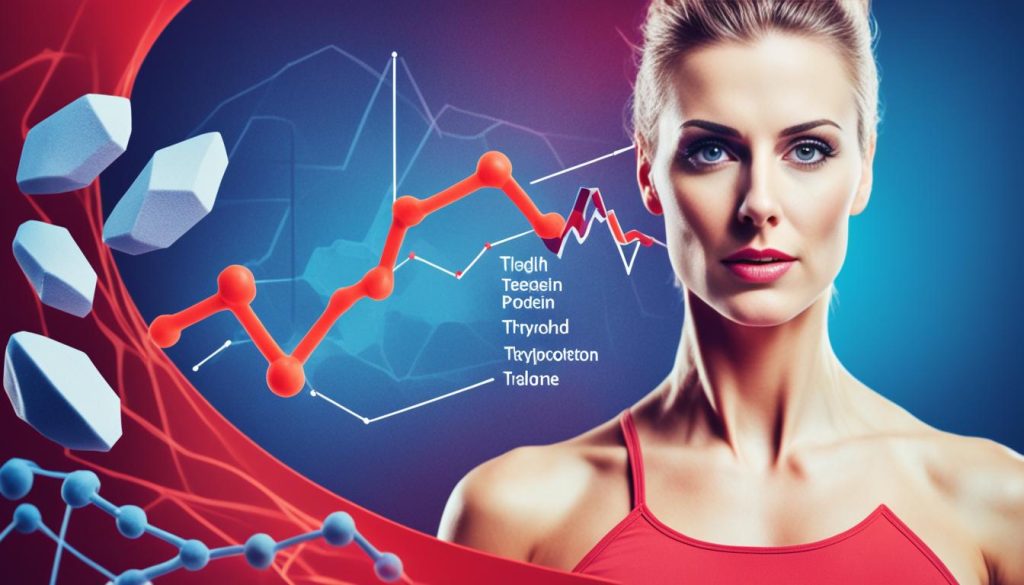Testosterone is an important hormone in both men and women. In women, testosterone levels are lower compared to men, but they still play a crucial role in maintaining overall health. The normal range of testosterone levels in women is between 15 to 70 ng/dL. However, it’s important to note that these levels can vary depending on factors such as age, thyroid function, and protein status. Understanding the normal range and factors that can affect testosterone levels can help in diagnosing and managing any imbalances.
Testosterone levels in women’s blood can vary widely, but the average range is between 15 to 70 ng/dL. It’s important to note that testosterone levels fluctuate throughout a woman’s life. They are at their highest during adolescence and early adulthood before gradually declining with age. Hormonal changes during menopause can also lead to a decrease in testosterone levels. These fluctuations in testosterone can impact women’s health, including sexual function, fertility, and overall well-being.
What is the Normal Level of Testosterone in a Woman?
When it comes to testosterone levels in women, there is a wide variation, but on average, it falls between 15 to 70 ng/dL. It’s important to understand that testosterone levels fluctuate throughout a woman’s life, with the highest levels seen during adolescence and early adulthood. As women age, testosterone gradually declines. Additionally, hormonal changes during menopause can lead to a decrease in testosterone levels.
Fluctuations in testosterone can have a significant impact on women’s health, including sexual function, fertility, and overall well-being. Maintaining optimal testosterone levels is essential for women to support their vitality and quality of life.
Understanding the average range of testosterone levels in women’s blood is the first step in recognizing any potential imbalances. By being aware of these fluctuations, women can identify the signs and symptoms associated with low or high testosterone levels and seek appropriate medical guidance for diagnosis and treatment.
The Importance of Hormone Balance
Maintaining optimal hormone balance, including testosterone levels, is crucial for women’s health. Testosterone plays a role in maintaining sexual desire, promoting muscle mass, regulating energy levels, and influencing behavior. Imbalances in testosterone levels, whether too high or too low, can have significant effects on overall well-being. It’s important to strive for a balanced hormone profile to ensure optimal health and wellness.
When it comes to optimal testosterone levels in women, balance is key. Testosterone is not only a hormone that is typically associated with men but also plays a vital role in women’s health. It influences sexual desire, supports muscle development, and affects mood and energy levels.
Having female testosterone levels within the optimal range is essential for overall well-being. When these levels are too low, women may experience a decrease in sexual desire, fatigue, and mood swings. On the other hand, high testosterone levels can lead to symptoms such as acne, excessive hair growth, and menstrual irregularities.
Striving for optimal testosterone levels helps women maintain a healthy balance and supports their overall health and vitality. Achieving this balance involves not only addressing any hormonal imbalances but also adopting a healthy lifestyle, including a well-balanced diet, regular exercise, and stress management.
It’s important to consult with a healthcare provider to assess and monitor testosterone levels and discuss any symptoms or concerns. They can provide guidance on hormone therapy, lifestyle adjustments, and other treatment options if necessary.
Remember, hormonal balance, including maintaining optimal testosterone levels in women, is a key aspect of overall health and well-being. By ensuring that testosterone levels are within the appropriate range, women can support their physical and emotional wellness.

| Benefits | Explanation |
|---|---|
| Increase in sexual desire | Optimal testosterone levels can help enhance libido and improve sexual satisfaction in women. |
| Promotes muscle mass | Testosterone contributes to muscle growth in women, supporting overall strength and physical performance. |
| Regulates energy levels | Having balanced testosterone levels can help combat fatigue and promote sustained energy throughout the day. |
| Influences behavior | Testosterone affects mood, motivation, and cognitive function, contributing to overall psychological well-being. |
Factors Affecting Testosterone Levels
Testosterone levels in women can be influenced by several factors, including thyroid function and protein status. The thyroid gland plays a critical role in hormone regulation, including testosterone production. Imbalances in thyroid hormone levels can disrupt the delicate balance of testosterone in the body. An underactive thyroid, known as hypothyroidism, can lead to decreased testosterone levels, while an overactive thyroid, called hyperthyroidism, can cause an increase in testosterone levels.
Similarly, protein status can impact testosterone levels in women. Adequate protein intake is essential for hormonal balance and the production of sex hormones, including testosterone. A diet lacking in protein can lead to decreased testosterone levels. On the other hand, consuming sufficient protein can support normal testosterone production and metabolism.
Other hormonal imbalances can also affect testosterone levels in women. Conditions such as polycystic ovary syndrome (PCOS) can lead to elevated levels of testosterone. PCOS is a hormonal disorder that causes enlarged ovaries with small cysts on the outer edges. Women with PCOS often experience higher than normal testosterone levels, which can lead to symptoms like irregular periods, acne, and hirsutism (excessive hair growth).

It’s important to recognize and address these factors affecting testosterone levels in women to ensure hormonal balance and overall well-being. Understanding the interplay between thyroid function, protein status, and hormonal imbalances can assist in diagnosing and managing testosterone-related concerns. Consulting with a healthcare professional can help in developing a personalized approach to optimize testosterone levels and support women’s health.
Symptoms of Testosterone Imbalances
Imbalances in testosterone levels can have noticeable effects on women’s health. These imbalances can manifest in various signs and symptoms, indicating either low or high testosterone levels.
Signs and Symptoms of Low Testosterone in Women
- Reduced sexual desire: Women with low testosterone levels may experience a decrease in libido.
- Changes in sleep patterns: Insomnia or disrupted sleep can be a symptom of low testosterone in women.
- Difficulty concentrating: Low testosterone levels may lead to cognitive difficulties, including trouble focusing or memory lapses.
- Decreased muscle mass: Women with low testosterone levels may notice a decline in muscle strength and mass.
- Depression: Mood swings, persistent sadness, and feelings of hopelessness can be linked to low testosterone levels in women.
Effects of High Testosterone Levels in Women
- Acne: High levels of testosterone can contribute to the development of acne in women.
- Irregular menstrual periods: Women with elevated testosterone may experience menstrual irregularities, such as missed or infrequent periods.
- Excessive hair growth: High testosterone levels can cause increased hair growth on the face, chest, or back, a condition known as hirsutism.
- Infertility: Imbalances in testosterone can affect fertility and make it challenging for women to conceive.
Recognizing these symptoms is crucial in identifying potential testosterone imbalances. If you experience any of these signs, it is important to consult with a healthcare professional for a proper diagnosis and appropriate treatment. Hormone therapy, lifestyle changes, or other interventions may be recommended to restore hormonal balance and improve overall well-being.
Testing and Diagnosis
To accurately diagnose testosterone levels in women, a blood test is typically conducted. This test, known as a testosterone test, measures the total amount of testosterone circulating in the blood. It is important to choose the best time for the test to be performed, as testosterone levels can vary throughout the day. Usually, the morning, when testosterone levels are at their highest, is considered the optimal time for testing.
The testosterone test is essential for diagnosing low testosterone in women and identifying any hormonal imbalances. Normal testosterone levels in women generally range from 15 to 70 ng/dL. However, it is important to note that the interpretation of the test results may depend on other factors, such as age, overall health, and the presence of any underlying medical conditions.
In addition to the testosterone test, healthcare providers may recommend evaluating other factors that can affect testosterone levels. For instance, thyroid function tests may be conducted to assess the impact of thyroid hormones on testosterone production and metabolism. Overall health evaluations can also provide valuable insights into hormonal imbalances.

The Role of Healthcare Providers
Consulting with a healthcare provider is crucial for accurate diagnosis and treatment. They have the expertise to interpret test results, assess symptoms, and consider individual factors. By analyzing the comprehensive results and collaborating with the patient, healthcare providers can develop personalized treatment plans to address low testosterone levels or any other hormonal imbalances.
Proper testing and diagnosis provide the foundation for appropriate treatment. Treatment options for low testosterone levels in women may include hormone replacement therapy or lifestyle modifications. Each treatment plan should be tailored to the individual’s unique needs and goals, taking into account factors such as age, overall health, and desired outcomes.
| Benefits of Proper Testing and Diagnosis | Benefits of Proper Treatment |
|---|---|
|
|
Through proper testing, diagnosis, and treatment, women can reclaim their vitality and maintain optimal hormonal health.
Conclusion
Maintaining normal testosterone levels is critical for women’s overall health and well-being. Understanding the normal range of testosterone levels, the factors that can influence these levels, and the symptoms of imbalances is essential in identifying and addressing any hormonal issues.
Proper testing and diagnosis are crucial steps in determining the appropriate treatment and management strategies for hormonal imbalances. By achieving optimal hormone balance, women can actively support their overall health and vitality.
It is recommended that women consult with their healthcare providers if they suspect any hormonal imbalances. Through comprehensive testing, including a blood test to measure testosterone levels, healthcare professionals can provide accurate diagnosis and develop personalized treatment plans.
By prioritizing hormone balance and working with their healthcare providers, women can optimize their well-being and enjoy a higher quality of life.




